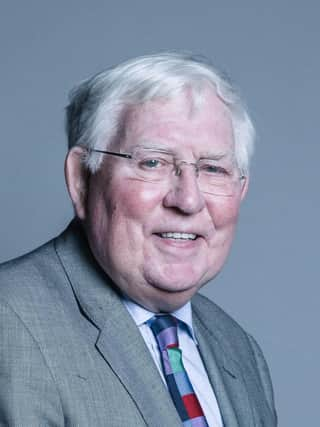Obituary: Lord O'Neill of Clackmannan


Martin O’Neill may have begun his working life as a teenage insurance clerk but he was a young man with high hopes and a formidable work ethic, firmly rooted in his family’s socialist principles.
His father John, a trade union activist and work study engineer at Ferranti in Edinburgh, was an intelligent man who had had a tough start in life, an experience which shaped his views and the outlook of his son who was determined to help create a fairer society.
Advertisement
Hide AdAdvertisement
Hide AdAfter attending Trinity Academy in Edinburgh, young O’Neill joined the Scottish Widows Fund for his first proper job but he soon widened his horizons, going to Heriot Watt University to study economics. There he set up the Socialist Society, got involved with the Students’ Representative Council and was elected president of the Scottish Union of Students, graduating in 1971.
That same year he took up a post as an assistant examiner at the Estate Duty Office of Scotland but he already had serious political ambitions and knew he wanted, ultimately, to become an MP.
Scotland in the early 1970s was facing rising unemployment and declining heavy industry, all against the backdrop of a Conservative government, and O’Neill was now heavily involved with Labour as secretary of the Edinburgh Labour Party.
By 1974, having taken a teaching qualification at Moray House College of Education, he was also a full-time teacher of modern studies at the capital’s Boroughmuir High School. While entering local politics may have been one potential route to advancing his political aims, becoming a councillor was not compatible with a teaching career. However his first opportunity to take on the opposition at the parliamentary ballot box came in the general election of October that year when he was put forward as the Labour candidate for Edinburgh North. He knew it was a safe Conservative seat but he was a charismatic communicator and came a creditable second.
Back at the chalkface, which was always going to be a temporary career, he moved from Boroughmuir to Craigmount High School in 1977 and also tutored in social science for the Open University.
His next parliamentary opportunity came in 1979 when he was selected to stand for the Clackmannan and East Stirlingshire seat against the prominent Scottish Nationalist George Reid. Although it was not deemed winnable, he overturned the sitting MP’s majority and began more than a quarter of a century’s diligent service to the constituency, through its various boundary and name changes.
Able, amiable and straight-talking, he was the Opposition spokesman on Scottish affairs before being appointed deputy spokesman on defence by Neil Kinnock in 1984. Four years later he became shadow defence secretary and took on the challenging role of leading the party away from its unilateral nuclear disarmament stance to a multilateral approach.
He worked hard to re-draw the policy – writing it on holiday while his family slept – and to persuade the doubters and continued to believe in the principle 30-odd years on. He also went on to become president of the Nuclear Industry Association.
Advertisement
Hide AdAdvertisement
Hide AdAfter leaving the opposition frontbench he served as chair of the select committee on trade and industry from 1995 to 2005 when he retired from the Commons and was made a life peer.
Never afraid of hard work, he had started out with a small majority and, though it was tough, had a firm plan of what needed to be achieved to improve life for his constituents and just knuckled down to get on with the job. He spent a large amount of time in his constituency, holding many surgeries and engaging with the community, schools and employers. As heavy engineering closed, among issues that particularly concerned him were male unemployment and getting a fair deal for small firms. Latterly he focused on the construction industry and problems facing small and medium-sized companies. He was president of the Specialist Engineering Contractors Group and chaired the Strategic Forum for Construction and the Building Services Engineering Employment Agency Alliance.
Outside the political sphere, where he was actively involved until the lockdown, he was a supporter of the National Secular Society, a patron of Humanists UK and a fan of jazz and the cinema.
He also remained a lifelong Hibernian FC fan serving as a director from 2005-2008. His loyalty to the club was evident when, during official business to Russia, he was captured on news footage leaving the Kremlin sporting the same green scarf he wore each week to Easter Road. But his enthusiasm did know some bounds: after a memorable cup final his jubilant companion ended up on the field, urging O’Neill to join him, to which he retorted, no doubt grudgingly, that it was inappropriate for a “peer of the realm” to be pictured on the pitch.
He is survived by his wife Elaine, sons Michael and Peter and three grandchildren.
ALISON SHAW